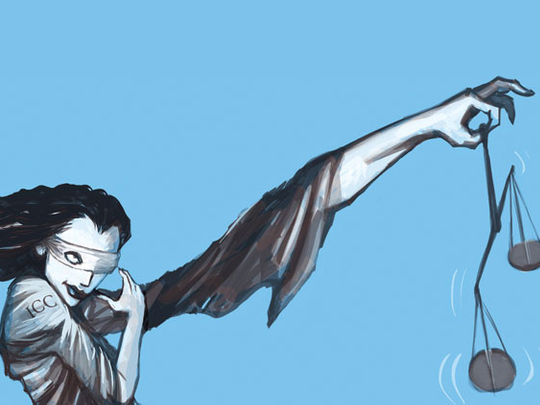
The only surprise over the African Union’s condemnation of the International Criminal Court (ICC) in The Hague for bias is that it took so long to come. Since its inception on July 1, 2002, to prosecute perpetrators of genocide, crimes against humanity, war crimes and crimes of aggression, the court’s impartiality has come into question.
Such crimes are being committed all over the world by world powers, despots and non-state actors, yet, although the court has been the recipient of complaints from 139 states, the only ones in the dock have been individuals from African nations — the Democratic Republic of the Congo, Uganda, the Central African Republic, Sudan, Kenya, Libya, Ivory Coast and Mali.
On paper, the ICC’s goals are beyond reproach. In theory, its very existence should prove a deterrent to megalomaniacs who use extreme force to repress their own citizens so as to hold on to power or wage wars of aggression without a United Nations Security Council mandate. In practice, the court appears to be politically driven and has been accused, rightly in my opinion, of acting as a tool of western neo-imperialism.
The court could argue in its defence that it is hidebound when it comes to pursuing countries that have refrained from becoming signatories, such as the US, Israel, Russia, India and China, which remain outside the court’s purview because three of those nations are permanent veto-holding members of the Security Council and one, Israel, is unconditionally protected by the US just as North Korea remains under China’s wing.
You might wonder why the Syrian President Bashar Al Assad isn’t a candidate for the ICC’s dock when he’s allegedly responsible for the killing of over 120,000 Syrians and is believed to have used chemical weapons.
The answer is simple. Syria is not a signatory to the Court and Russia would block any such Security Council resolution by wielding its veto. Likewise, George W. Bush, whose administration’s wars resulted in over a million deaths in Iraq and Afghanistan, can sleep soundly in this regard for the duration of his life.
Immunity
This translates to de facto immunity for permanent Security Council member states as well as those of their allies that haven’t recognised the ICC’s authority. The only other avenue through which non-signatories could be referred to the ICC is via the Security Council under Chapter VII.
So you have a situation whereby Security Council veto-holders refuse to recognise the court’s jurisdiction over their own crimes, but have the ability to refer countries that have responsibly signed up — as well as those that haven’t, such as Sudan and Libya.
Moreover, Security Council permanent member countries tend to ignore the stipulation under the ICC’s Charter that the primary venue for prosecuting war criminals is on their own soil – and the ICC is a court of last resort.
The rules of the game do, however, permit nationals of non-signatory states committing crimes in countries that have signed up to be dealt with by the ICC, but to counter this, the Bush administration used carrots and sticks to twist the arms of 102 states to sign one-sided bilateral agreements allowing immunity for US citizens; another 52 countries were lobbied/leant on but ultimately refused to bend to this grossly unfair setup.
Washington did support the Rome Treaty and ratified the international court but stepped back from the dotted line to protect US citizens, especially US forces, as well as US sovereignty from its reach. The question here is why aren’t other governments similarly concerned, in particular those of vulnerable smaller states when it’s evident that the ICC deals with small fry leaving man-eating sharks to merrily circle?
It’s taken 12 years, but Africa has finally got the message. An African Union Summit held in Ethiopia characterised the ICC as “unfair” and debated withdrawing from the court’s jurisdiction.
President Uhuru Kenyatta, whose trial at The Hague is scheduled for November on charges of crimes against humanity, said: “The ICC has been reduced into a painfully farcical pantomime, a travesty that adds insult to the injury of victims. It stopped being the home of justice the day it became the toy of declining imperial powers.” African states are urging Kenyatta, whose country is reeling from a terrorist attack, not to show up on the trial date. There was no consensus among AU delegates for the body to pull out of the ICC at this juncture but many feel that trying sitting leaders abroad undermines their authority at home, causing instability and thwarting peace and reconciliation efforts. The AU has requested a deferral of Kenyatta’s trial and has passed a resolution to the effect that no sitting African head of state should be subject to any international court.
Like the Security Council, the ICC is under the sway of nations that view themselves as exceptional with the right to dispense ‘justice’ to others although they remain safely behind an impenetrable shield by virtue of their military and economic might.
As long as might is considered right, the concept of international justice is as flawed as the court in The Hague that espouses it.
Linda S. Heard is a specialist writer on Middle East affairs. She can be contacted at lheard@gulfnews.com










